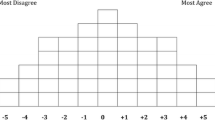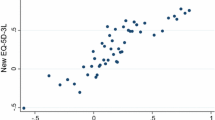Abstract
Background
The UK Medical Research Council approach to evaluating complex interventions moves through development, feasibility, piloting, evaluation and implementation in an iterative manner. This approach might be useful as a conceptual process underlying complex valuation tasks.
Objective
The objective of the study was to explore the applicability of such a framework using a single case study (valuing the ICECAP-Supportive Care Measure) and considering three key uncertainties: the number of response categories for the measure; experimental design; and the potential for using slightly different variants of the measure with the same value set.
Methods
Three on-line pilot studies (n = 204, n = 100, n = 102) were undertaken during 2012 and 2013 with adults from the UK general population. Each used variants of discrete choice and best-worst scaling tasks; respondents were randomly allocated to different groups to allow exploration of the number of levels for the instrument (four or five), optimal experimental design and the values for alternative wording around prognosis. Conditional logit regression models were used in the analysis and variance scale factors were explored.
Results
The five-level version of the measure seemed to result in simplifying heuristics. Plotting the variance scale factors suggested that best-worst scaling answers were approximately four times more consistent than the discrete choice answers. The likelihood ratio test indicated there was virtually no difference in values between the differently worded versions.
Conclusion
Rigorous piloting can improve the design of valuation studies. Thinking in terms of a ‘complex valuation framework’ may emphasise the importance of conducting and funding such rigorous pilots.


Similar content being viewed by others
References
Medical Research Council. A framework for development and evaluation of RCTs for complex interventions to improve health. London: Medical Research Council; 2000.
Campbell M, Fitzpatrick R, Haines A, Kinmouth AL, Sandercock P, Spiegelhalter D, Tyrer P. Framework for design and evaluation of complex interventions to improve health. BMJ. 2000;321:694–6.
Craig P, Dieppe P, Macintyre S, Mitchie S, Nazareth I, Petticrew M. Developing and evaluating complex interventions: the new Medical Research Council guidance. BMJ. 2008;337:a1655.
Coast J, Al-Janabi H, Sutton E, Horrocks S, Vosper J, Swancutt D, Flynn TN. Using qualitative methods for attribute development for discrete choice experiments. Health Econ. 2012;21(6):730–41.
Coast J, Horrocks S. Developing attributes and levels for discrete choice experiments using qualitative methods. J Health Serv Res Pol. 2007;12:25–30.
Normand C. Measuring outcomes in palliative care: limitations of QALYs and the road to PalYs. J Pain Symptom Manage. 2009;38:27–31.
Gomes B, Harding R, Foley KM, Higginson I. Optimal approaches to the health economics of palliative care: report of an international think tank. J Pain Symptom Manage. 2009;38:4–10.
Steinhauser KE, Christakis NA, Clipp EC, McNeilly M, McIntyre L, Tulsky JA. Factors considered important at the end of life by patients, family, physicians, and other care providers. J Am Med Assoc. 2000;284:2476–82.
Sutton E, Coast J. Development of a supportive care measure for economic evaluation of end-of-life care, using qualitative methods. Palliat Med. 2014;28:151–7.
Sutton E, Coast J. ‘Choice is a small word with a huge meaning’: autonomy and decision making at the end of life. Policy Politics. 2012;40(2):211–26.
Flynn TN, Louviere J, Peters T, Coast J. Best-worst scaling: what it can do for health care research and how to do it. J Health Econ. 2007;26:171–89.
Louviere JJ, Hensher DA, Swait JD. Stated choice methods: analysis and application. Cambridge: Cambridge University Press; 2000.
Flynn TN. Valuing citizen and patient preferences in health: recent developments in three types of best-worst scaling. Exp Rev Pharmacoecon Outcomes Res. 2010;10(3):259–67.
Brouwer WBF, Culyer AJ, van Exel NJA, Rutten FFH. Welfarism vs. extra-welfarism. J Health Econ. 2008;27:325–38.
Coast J, Smith RD, Lorgelly P. Welfarism, extra-welfarism and capability: the spread of ideas in health economics. Social Sci Med. 2008;67:1190–8.
National Institute for Health and Care Excellence. Guide to the methods of technology appraisal 2013. Process and methods guide. London: NICE; 2013.
Coast J. Strategies for the economic evaluation of end-of-life care: making a case for the capability approach. Exp Rev Pharmacoecon Outcomes Res. 2014;14(4):473–82.
Herdman M, Gudex C, Lloyd A, Janssen MF, Kind P, Parkin D, Bonsel G, Badia X. Development and preliminary testing of the new five-level version of EQ-D (EQ-5D-5L). Qual Life Res. 2011;20:1727–36.
Al-Janabi H, Flynn TN, Coast J. Development of a self-report measure of capability wellbeing for adults: the ICECAP-A. Qual Life Res. 2012;21:167–76.
Flynn TN, Huynh E, Peters TJ, Al-Janabi H, Clemens S, Moody A, Coast J. Scoring the ICECAP-A capability instrument: estimation of a UK general population tariff. Health Econ. 2015;24(3):258–69.
McFadden D. Conditional logit analysis of qualitative choice behaviour. In: Zarembka P, editor. Frontiers in econometrics. New York: Academic Press; 1974. p. 105–42.
Swait J, Louviere J. The role of the scale parameter in the estimation and comparison of multinomial logit models. J Market Res. 1993;30:305–14.
Flynn TN, Peters TJ, Coast J. Quantifying response shift or adaptation effects in quality of life by synthesising best-worst scaling and discrete choice data. J Choice Model 2013;6(1):34–43.
Louviere JJ, Flynn TN, Marley AAJ. Best-worst scaling: theory, methods and applications. Cambridge: Cambridge University Press; 2015.
Acknowledgments
This work was supported by the European Research Council (261098 EconEndLife). The work was conducted whilst Joanna Coast was based at the University of Birmingham. We thank the members of the EconEndLife advisory group and all research participants. We also thank Raymond Oppong and participants at the International Choice Modelling Conference, Sydney, July 2013 and the iHEA congress, Sydney, 2013 for comments on earlier versions of the paper.
Author contributions
All authors contributed to the design of the study, interpretation of data and final approval. JC additionally conceived the overall study and wrote the first draft of the paper. TNF additionally conceived the experimental design and analysis plan for the DCE/BWS, acquired and analysed the data, and contributed to revising the paper. EH additionally acquired and analysed the data and contributed to revising the paper. PK additionally oversaw the ethical aspects of the study and contributed to revising the paper.
Author information
Authors and Affiliations
Corresponding author
Ethics declarations
EH, TNF and PK declare that they have no conflict of interest. JC received a grant for the work from the European Research Council (261098 EconEndLife).
Rights and permissions
About this article
Cite this article
Coast, J., Huynh, E., Kinghorn, P. et al. Complex Valuation: Applying Ideas from the Complex Intervention Framework to Valuation of a New Measure for End-of-Life Care. PharmacoEconomics 34, 499–508 (2016). https://doi.org/10.1007/s40273-015-0365-9
Published:
Issue Date:
DOI: https://doi.org/10.1007/s40273-015-0365-9




